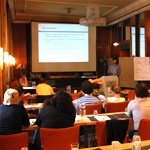Entrare In Europa: Consensus And Transformation In Italian Capitalism
-
-

-
Presentation speakers
- Davide Bradanini, IMT Advanced Studies Institute
- Download presentation
Abstract:
The aim of this paper is to analyze the moment of consensus within the Italian political economy that corresponded to the signing of the Maastricht treaty in 1992. In the following year, the social partners signed a tripartite agreement with the government that aimed at allowing Italy to respect the Maastricht criteria and thus joining the first group of the Eurozone, which it did at the end of the decade. Although this conjuncture has been widely studied, my aim is to show that consensus formation and the transformations within a national political economy can be better understood using a neo-Gramscian framework that focuses on the concept of ‘common sense’, which forms the basis upon which human beings think about all aspects of social life, including the need to produce. Thus, we will show that common sense within capitalist societies is the foundation upon which political and social struggle takes place, and thus hegemonies are developed and reproduced. The central questions that will inform this work are thus: to what forms of common sense did the social partners refer in order to find a terrain of consensus on the issue of entrare in Europa, or joining Europe, as the debate was framed? What elements were depoliticized, and how? -
Related Presentations

The Notion Of European Cinema: Nesting The Otherness
- Nevena Dakovic

Sceptical Images Of The European Union. Euroscepticism Of Turkish University Students
- Zeliha Nilüfer Nahya




















